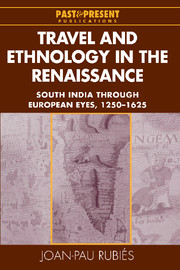Book contents
- Frontmatter
- Contents
- List of illustrations
- Preface
- Acknowledgements
- A note on spelling and vocabulary
- 1 In Search of India: the empire of Vijayanagara through European eyes
- 2 Marco Polo's India and the Latin Christian tradition
- 3 Establishing lay science: the merchant and the humanist
- 4 Ludovico de Varthema: the curious traveller at the time of Vasco da Gama and Columbus
- 5 The Portuguese and Vijayanagara: politics, religion and classication
- 6 The practice of ethnography: Indian customs and castes
- 7 The social and political order: Vijayanagara decoded
- 8 The historical dimension: from native traditions to European orientalism
- 9 The missionary discovery of South Indian religion: opening the doors of idolatry
- 10 From humanism to scepticism: the independent traveller in the seventeenth century
- Conclusion: Before Orientalism
- Appendix
- Bibliography
- Index
- Past and Present Publications
7 - The social and political order: Vijayanagara decoded
Published online by Cambridge University Press: 29 October 2009
- Frontmatter
- Contents
- List of illustrations
- Preface
- Acknowledgements
- A note on spelling and vocabulary
- 1 In Search of India: the empire of Vijayanagara through European eyes
- 2 Marco Polo's India and the Latin Christian tradition
- 3 Establishing lay science: the merchant and the humanist
- 4 Ludovico de Varthema: the curious traveller at the time of Vasco da Gama and Columbus
- 5 The Portuguese and Vijayanagara: politics, religion and classication
- 6 The practice of ethnography: Indian customs and castes
- 7 The social and political order: Vijayanagara decoded
- 8 The historical dimension: from native traditions to European orientalism
- 9 The missionary discovery of South Indian religion: opening the doors of idolatry
- 10 From humanism to scepticism: the independent traveller in the seventeenth century
- Conclusion: Before Orientalism
- Appendix
- Bibliography
- Index
- Past and Present Publications
Summary
A JOURNEY ACROSS THE MOUNTAINS
Some time after 1531 an anonymous Portuguese in Goa collected two descriptions of Vijayanagara and sent them to Europe, probably to the official chronicler of the Portuguese Indies, the humanist-educated Joäo de Barros:
it seemed necessary to do what your honour desired of me, namely, to search for men who had formerly been in Bisnaga; for I know that no one goes there without bringing away his quire of paper written about its affairs. Thus I obtained this summary from one Domingos Paes, who is around, and who went to Bisnaga in the time of Crisnarao [Krishna Deva Raya] when Cristovaäo de Figueiredo was there. And because a man can not say everything, I obtained another from Fernaäo Nuniz, who was there for three years trading in horses (which did not prove remunerative). Since one relates things which another does not, I send both the summaries which they wrote over there, one, as I said, at the time of Crisnarao, the other sent from there six months ago. I have done this so that your honour can gather what is useful to you from both
The sender was not wrong in thinking that the two long and detailed reports, by Domingos Paes and Fernäo Nunes, complemented each other. The narrative of Paes, the earlier document, was presented as the account of a personal experience rather than as a systematic geographical description of the kind attempted by Duarte Barbosa.
- Type
- Chapter
- Information
- Travel and Ethnology in the RenaissanceSouth India through European Eyes, 1250–1625, pp. 223 - 250Publisher: Cambridge University PressPrint publication year: 2000



